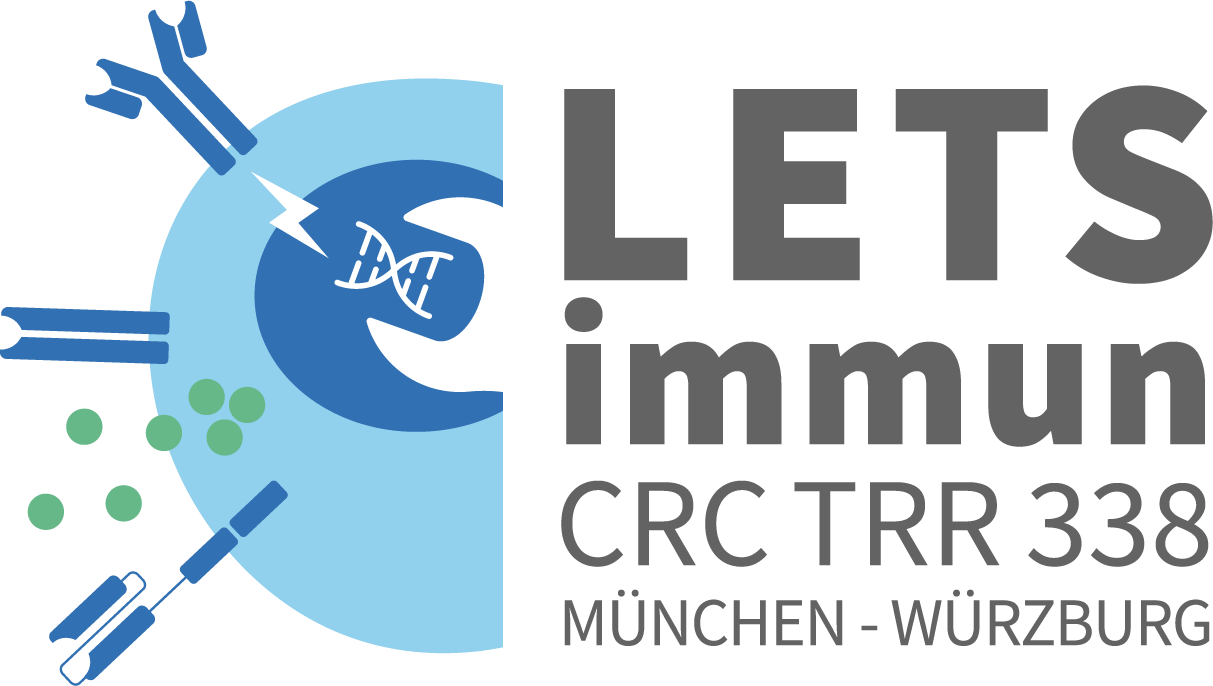
Prof. Dr. med. Jürgen Ruland
Institut für Klinische Chemie und Pathobiochemie
Technische Universität München, Klinikum rechts der Isar
Ismaninger Str. 22
81675 München
Phone: +49 89 4140 4750
E-mail: j.ruland@tum.de
University training and degree
1987 – 1994 Study of Medicine, Justus-Liebig-Universität Gießen; Medical College of Pennsylvania, Pittsburg, PA, USA
Advanced academic qualifications
2014 Board Certification: Laboratory Medicine
2005 Habilitation: Internal Medicine, Technical University of Munich, Germany, Mentor: Christian Peschel
1996 Doctorate: Medicine, Institut für Pharmakologie, Justus-Liebig-Universität Gießen, Germany, Mentor: Florian Dreyer
Postgraduate professional career
since 2012 Full Professor (W3) and Director, Institute of Clinical Chemistry and Pathobiochemistry, Technical University of Munich, Germany
2010 – 2011 Full Professor (W3) and Director, Institut für Molekulare Immunologie, Technical University of Munich, Germany
2003 – 2010 Clinical Resident and Head of Laboratory, 3. Medizinische Klinik, Klinikum rechts der Isar, Technical University of Munich, Germany
1997 – 2002 Postdoctoral Fellow and Research Fellow, Amgen Research Institute and Ontario Cancer Institute, University of Toronto, Toronto, Canada
1994 – 1996 Clinical Resident, Klinikum rechts der Isar, Technical University of Munich and Universitätsklinikum Freiburg, Germany
2019 Advanced Grant of the European Research Council (ERC)
since 2018 Speaker SFB (CRC) 1335 “Aberrant Immune Signals in Cancer”
2016 Election to The Bavarian Academy of Sciences and Humanities
2015 Election to Leopoldina – Nationale Akademie der Wissenschaften
since 2015 Board Member, International Max Planck Research School for Molecular and Cellular Life Sciences
2012 Advanced Grant of the European Research Council (ERC)
since 2012 Editoral Board “Trends in Immunology”
2010 Paul Martini Prize
2010 Wilhelm Warner Award for Cancer Research
2007 Science Award of the Arbeitsgemeinschaft für Internistische Onkologie
2006 Artur-Pappenheim Award of the German Society for Haematology and Oncology
2003 Max-Eder Fellowship of the German Cancer Aid (Dt. Krebshilfe)
a) Articles published by outlets with scientific quality assurance, book publications and works accepted for publication, but not yet published
1. Rosenbaum, M., Gewies, A., Pechloff, K., Heuser, C., Engleitner, T., Gehring, T., Hartjes, L., Krebs, S., Krappmann, D., Kriegsmann, M., Weichert, W., Rad, R., Kurts, C., Ruland, J. (2019). Bcl10-controlled Malt1 paracaspase activity is key for the immune suppressive function of regulatory T cells. Nat Commun 10, 2352.
2. Wartewig, T., Kurgyis, Z., Keppler, S., Pechloff, K., Hameister, E., Ollinger, R., Maresch, R., Buch, T., Steiger, K., Winter, C., Rad, R., Ruland, J. (2017). PD-1 is a haploinsufficient suppressor of T cell lymphomagenesis. Nature 552, 121-125.
3. Roth, S., Rottach, A., Lotz-Havla, A.S., Laux, V., Muschaweckh, A., Gersting, S.W., Muntau, A.C., Hopfner, K.P., Jin, L., Vanness, K., Petrini, J.H., Drexler, I., Leonhardt, H., Ruland, J. (2014). Rad50-CARD9 interactions link cytosolic DNA sensing to IL-1beta production. Nat Immunol 15, 538-45.
4. Neumann, K., Castineiras-Vilarino, M., Hockendorf, U., Hannesschlager, N., Lemeer, S., Kupka, D., Meyermann, S., Lech, M., Anders, H.J., Kuster, B., Busch, D.H., Gewies, A., Naumann, R., Gross, O., Ruland, J. (2014). Clec12a is an inhibitory receptor for uric acid crystals that regulates inflammation in response to cell death. Immunity 40, 389-99.
5. Strasser, D., Neumann, K., Bergmann, H., Marakalala, M.J., Guler, R., Rojowska, A., Hopfner, K.P., Brombacher, F., Urlaub, H., Baier, G., Brown, G.D., Leitges, M., Ruland, J. (2012). Syk kinase-coupled C-type lectin receptors engage protein kinase C-sigma to elicit Card9 adaptor-mediated innate immunity. Immunity 36, 32-42.
6. Poeck, H., Bscheider, M., Gross, O., Finger, K., Roth, S., Rebsamen, M., Hannesschlager, N., Schlee, M., Rothenfusser, S., Barchet, W., Kato, H., Akira, S., Inoue, S., Endres, S., Peschel, C., Hartmann, G., Hornung, V., Ruland, J. (2010). Recognition of RNA virus by RIG-I results in activation of CARD9 and inflammasome signaling for interleukin 1 beta production. Nat Immunol 11, 63-9.
7. Gross, O., Poeck, H., Bscheider, M., Dostert, C., Hannesschlager, N., Endres, S., Hartmann, G., Tardivel, A., Schweighoffer, E., Tybulewicz, V., Mocsai, A., Tschopp, J., Ruland, J. (2009). Syk kinase signalling couples to the Nlrp3 inflammasome for anti-fungal host defence. Nature 459, 433-6.
8. Ferch, U., zum Buschenfelde, C.M., Gewies, A., Wegener, E., Rauser, S., Peschel, C., Krappmann, D., Ruland, J. (2007). MALT1 directs B cell receptor-induced canonical nuclear factor-kappaB signaling selectively to the c-Rel subunit. Nat Immunol 8, 984-91.
9. Gross, O., Gewies, A., Finger, K., Schafer, M., Sparwasser, T., Peschel, C., Forster, I., Ruland, J. (2006). Card9 controls a non-TLR signalling pathway for innate anti-fungal immunity. Nature 442, 651-6.
10. Ruland, J., Duncan, G.S., Elia, A., del Barco Barrantes, I., Nguyen, L., Plyte, S., Millar, D.G., Bouchard, D., Wakeham, A., Ohashi, P.S., Mak, T.W. (2001). Bcl10 is a positive regulator of antigen receptor-induced activation of NF-kappaB and neural tube closure. Cell 104, 33-42.
